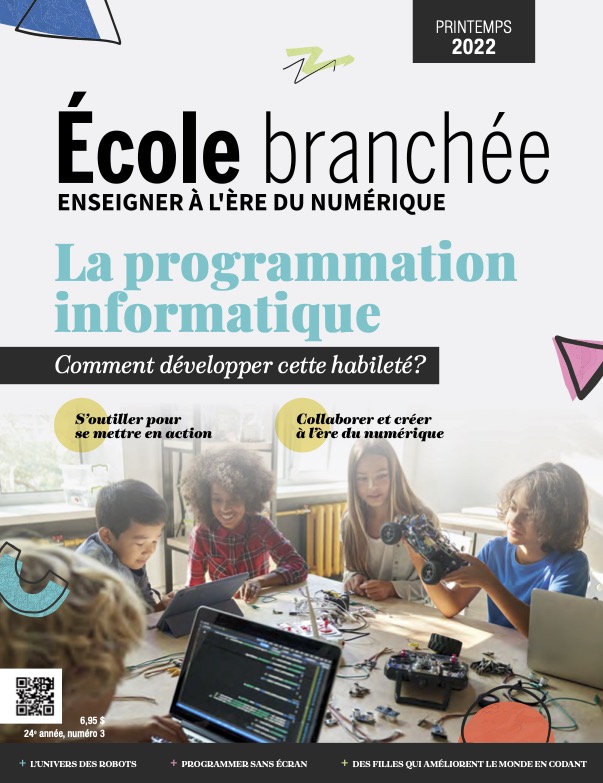Ce document contient l’ensemble des références associées au numéro du magazine École branchée, Vol. 24 no 3 du printemps 2022.
La programmation informatique : une compétence à développer
Références :
Barma, S. (2018). Réaliser une étude de cas multiple qui vise à affiner les connaissances sur l’usage pédagogique ou didactique de la programmation dans les écoles du Québec. Université Laval. https://lel.crires.ulaval.ca/sites/lel/files/barma_mees_rapport_final_-_lel.pdf
Davidson, A.-L. et Ruby Ivan. (2019, 19 septembre). Pourquoi apprendre à coder? La Conversation. https://theconversation.com/pourquoi-apprendre-a-coder-109206
Häkkinen et al., 2017. Preparing teacher-students for twenty-first-century learning practices
(PREP 21): a framework for enhancing collaborative problem-solving and strategic learning skills, Teachers and Teaching, 23:1, 25-41, https://doi.org/10.1080/13540602.2016.1203772
Ministère de l’Éducation du Québec. (2019). Continuum de développement de la compétence numérique – Cadre de référence de la compétence numérique. Gouvernement du Québec. http://www.education.gouv.qc.ca/fileadmin/site_web/documents/ministere/continuum-cadre-reference-num.pdf
Ministère de l’Éducation du Québec. (2020). L’usage pédagogique de la programmation informatique. Gouvernement du Québec. http://www.education.gouv.qc.ca/fileadmin/site_web/documents/ministere/Usage-pedagogique-programmation-informatique.pdf
Poleemploi.fr. 85 % des emplois de 2030 n’existent pas encore. https://www.pole-emploi.fr/actualites/le-dossier/les-metiers-de-demain/85-des-emplois-de-2030-nexistent.html#
Resnick, M., Maloney, J., Monroy-Hernandez, A., Rusk, N., Eastmond, E., Brennan, K., Millner, A., Rosenbaum, E., Silver, J., Silverman, B., and Kafai, Y. (2009). Scratch: programming for all. Communications of the ACM 52(11), 60–68.
Rioux, M. (2021). Commencer la programmation avec ScratchJr ou Scratch en classe. École branchée. https://ecolebranchee.com/commencer-la-programmation-avec-scratchjr-ou-scratch-en-classe/
Dans l’univers des robots
Des ressources
RÉCIT du préscolaire : recitpresco.qc.ca/fr/robotique
RÉCIT Inclusion et adaptation scolaire : recitas.ca/robotique
RÉCIT Univers social : recitus.qc.ca/technologie/publication/code-us
RÉCIT MST : https://robot-tic.qc.ca/
Des exemples de projet
À la recherche d’idées? Voici quelques suggestions de projets par discipline. Par ailleurs, il ne faut pas oublier que la robotique favorise la réalisation de projets multidisciplinaires.
Arts
Créer et interpréter des danses (chorégraphies)
Ajouter des interactions, des mouvements ou des sons à des œuvres existantes
Univers social
Réaliser une maquette interactive (ex. : village autochtone, seigneurie, territoire agricole)
Raconter l’histoire d’un personnage marquant
Langues
Écrire un récit qui inclut un parcours à coder avec un robot
Programmer les trajets d’un personnage dans un livre
Mathématiques
Travailler le plan cartésien, les angles, la mesure de longueur et de temps
Approfondir la compréhension de certains concepts arithmétiques de base
Programmer des simulateurs d’expériences aléatoires
Sciences
Expliquer le cycle de l’eau (évaporation, condensation, précipitation, ruissellement et infiltration)
Créer des objets pour déterminer les propriétés mécaniques de leurs matériaux, explorer les mouvements, etc.
Distinguer conducteurs et isolants électriques
Description de robots pouvant être utilisés pour la robotique à l’école
(en ordre alphabétique, selon la liste du Centre d’acquisitions gouvernementales du Québec)
https://ecolebranchee.com/description-robots
Pourquoi apprendre à programmer?
Papert, S. (1980). Mindstorms: Children, computers, and powerful ideas. Basic Books. https://docs.google.com/viewer?a=v&pid=sites&srcid=ZGVmYXVsdGRvbWFpbnxha2hsYWdoZWF8Z3g6NzgyOWYxNWNjMjE5ZjVh, p.19
Romero, M. (2019). La programmation n’est pas que technologique. Programmer : une démarche sensible, culturelle et citoyenne pour résoudre des problèmes. Spectre, 49. https://www.researchgate.net/publication/336702915_La_programmation_n’est_pas_que_technologique_Programmer_une_demarche_sensible_culturelle_et_citoyenne_pour_resoudre_des_problemes
Ministère de l’Éducation. Compétences transversales.http://www.education.gouv.qc.ca/fileadmin/site_web/documents/education/jeunes/pfeq/PFEQ_competences-transversales-primaire.pdf
Intégrer le numérique en classe, un bloc à la fois!
Éthier, Lefrançois et Demers. (2014) Faire aimer et apprendre l’histoire et la géographie au primaire et au secondaire, Éditions Multimondes, https://editionsmultimondes.com/livre/faire-aimer-et-apprendre-l-histoire-et-la-geographie-au-primaire-et-au-secondaire/
Cadre de référence de la compétence numérique : http://www.education.gouv.qc.ca/fileadmin/site_web/documents/ministere/Cadre-reference-competence-num.pdf
Voir les autoformations :
Minecraft Education en MST : https://campus.recit.qc.ca/course/view.php?id=329
Jeux sérieux en univers social : https://campus.recit.qc.ca/course/view.php?id=60#section-0
RÉCIT de l’univers social : recitus.qc.ca
L’activité RÉCITs autochtones : https://recitsautochtones.recitdp.qc.ca/
Padlet de ressources : https://padlet.com/srimcssbf/us
S’initier au numérique sans écran, c’est possible!
Ressources :
Activités à télécharger (COLORI) : https://colori.education/
Activités préparatoires sans écran (CSSDM) : https://cybersavoir.csdm.qc.ca/robotique/activites-sans-technologie/
Activités sans techno (service national du RÉCIT du préscolaire) : https://recitpresco.qc.ca/fr/pages/robotique/activites-preparatoires-lire-des-plans-manipuler-des-engrenages
Références :
Colgan, L. (2020, 7 décembre). Why a computer isn’t the first thing you need when teaching kids to code. The Conversation. https://theconversation.com/why-a-computer-isnt-the-first-thing-you-need-when-teaching-kids-to-code-149722
Bodu, F. (2020). La pédagogie Montessori : comprendre ses fondamentaux et les mettre en application. Hatier.
Derrière chaque programmeur se cache un débogueur
Ressources :
Liste de ressources sur le débogage de l’Université d’Auckland : https://celt.auckland.ac.nz/debugging-resources
What are computer bugs, BBC Learning – Computers : https://www.youtube.com/playlist?list=PLDMP_rFBErMNgVRpiMMBfvwc2toZdg4sj
Kelly Lougkeed’s 10 best practices for helping students debug their code: https://medium.com/upperlinecode/8-best-practices-for-helping-students-debug-their-code-878d78e9f2f5
Onward and upward:: Fostering a growth mindset, LEARN Blog : https://blogs.learnquebec.ca/2015/09/onward-and-upward-fostering-a-growth-mindset (en anglais)
Making Friends With Failure, LEARN Blog : https://blogs.learnquebec.ca/2021/01/making-friends-with-failure (en anglais)
Défis de débogage Scratch https://sites.google.com/site/scratchadventures/lessons/debug-1
Cartes de débogage Scratch https://gettingunstuck.gse.harvard.edu/strategies.html ou français – https://drive.google.com/file/d/1P3sLUUQTaSHtNUUAPih2202ehhI0r1Yb/view?usp=sharing
Vidéo de Grace Hopper Remembered : https://www.youtube.com/watch?v=iYt3aIlKqGE
Références :
Chen, L., Chan, E., Denny, P., Luxton-Reilly, A. et Tempero, E. (2019). Towards a framework for teaching debugging. 79-86. 10.1145/3286960.3286970.
Monteiro, T. (2019, 31 octobre). Improve how you code: Understanding rubber duck debugging. Duckly. https://duckly.com/blog/improve-how-to-code-with-rubber-duck-debugging
Papert, S. (1980). Mindstorms: Children, computers, and powerful ideas. Basic Books. https://docs.google.com/viewer?a=v&pid=sites&srcid=ZGVmYXVsdGRvbWFpbnxha2hsYWdoZWF8Z3g6NzgyOWYxNWNjMjE5ZjVh



